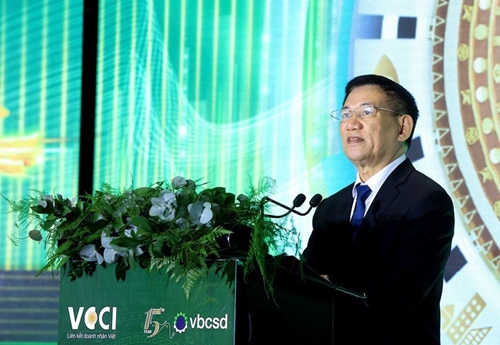Phoc, who also chairs the National Council on Sustainable Development, called firms “the place where creative ideas become reality, where new business models take shape and where Environmental, Social and Governance (ESG) standards take root."
    |
 |
|
Deputy Prime Minister Ho Duc Phoc delivers a speech at the 12th VCSF in Hanoi on August 22. |
He praised the Vietnam Business Council for Sustainable Development (VBCSD) under the Vietnam Chamber of Commerce and Industry (VCCI) for its 15-year journey in promoting responsible business practices. The Government will continue to act as a development enabler and companion of enterprises, Phoc stressed.
To support the transition, policies will focus on four key pillars: completing institutions and legal frameworks to ensure a favorable business environment; developing strategic infrastructure in transport, renewable energy, digital connectivity and climate resilience; boosting green finance and sustainable credit markets; and mobilizing social and international resources to help enterprises adopt green and digital business models and improve their competitiveness in global value chains.
This is the time for businesses to accelerate transformation, to innovate and to embrace sustainable practices as part of their growth strategy, the Deputy PM said, noting that 2025 marks a critical juncture as it is the final year of the current five-year socio-economic development plan and the foundation for Vietnam’s path towards becoming a high-income country by 2045.
VCCI Chairman Pham Tan Cong said over the past 12 years, the forum has been a platform for dialogue and policy advocacy, helping translate the Party and Government's resolutions into practice, while enhancing Vietnam’s competitiveness and investment climate.
Marking VBCSD’s 15th anniversary this year, he reaffirmed the council’s role in connecting the Government, businesses and partners to advance sustainability.
VCCI Vice Chairman and VBCSD President Nguyen Quang Vinh echoed this view, stressing that sustainable development must be considered a “survival strategy, not merely a matter of corporate social responsibility.”
He said VBCSD will continue to expand awareness, training, international cooperation and partnerships to strengthen business commitment to sustainable and responsible growth, helping Vietnam move into a new era of greener, more inclusive prosperity.
A recurring theme at the forum was the importance of high-quality human resources in sustaining long-term growth.
Binu Jacob, General Director of Nestlé Vietnam and co-chair of VBCSD, said nurturing young talents is a key pillar of the company’s strategy and a decisive factor for Vietnam’s development.
“Through initiatives such as Nestlé Needs YOUth and the Nesternship program, we want to create opportunities for young people to unlock their creativity and contribute to national progress,” he said.
Nestlé has also teamed up with Vietnam National University-Ho Chi Minh City to promote the 'three-party cooperation' model linking the Government, academia and enterprises, aligning education with market and technological needs.
“These are concrete actions to realize our commitment to a green, inclusive and sustainable future in line with Resolution 57-NQ/TW of the Politburo on science, technology, innovation and digital transformation,” he said.
For his contributions, Jacob received the VCCI Medal 'For the Development of Vietnamese Business' during the event.
Nguyen Hoang Giang, general director of Saigon Trading Co., Ltd. (SATRACO), a member of SABECO, said that sustainability in the new era requires measurable and consistent action, not just vision statements.
“At SABECO, ESG is not a slogan but a philosophy of operations. It defines how we create value, measure success and uphold social responsibility,” he said.
“In a world of uncertainty, ESG strengthens resilience. We want to grow sustainably together with the Government, partners and the community, so that no one is left behind and the value we create endures for both the company and the country,” he said.
The forum, held annually since 2014, attracted over 400 delegates in person and thousands online, featuring more than 30 speakers. Discussions covered green transition practices, ESG strategies and innovation ecosystems to support sustainable business models.
Source: VNA